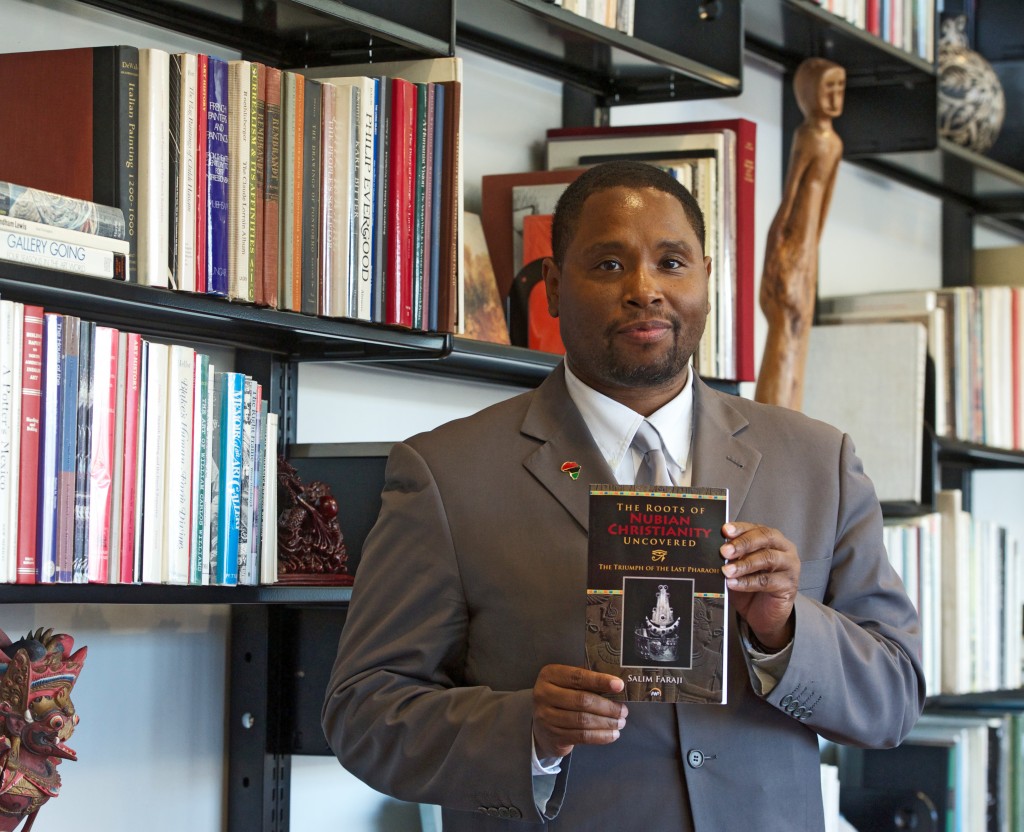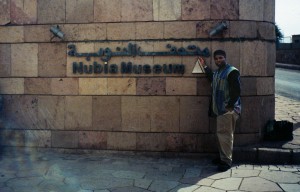
Salim Faraji has been on a 25-year quest for answers to a transformation that took place more than 1,500 years ago. His findings led him to author the book “The Roots of Nubian Christianity Uncovered: The Triumph of the Last Pharaoh” (African World Press: Trenton and London, 2012). In it, Faraji, associate professor and chair of Africana studies at California State University, Dominguez Hills, explores the influence that a 5th century Nubian pharaoh had on ancient Nubian culture and its conversion to Christianity.
“This king, Silko, is pivotal. He is like Constantine was in the Roman Empire. Constantine is really the emperor who makes Christianity the legitimate religion in the Roman Empire,” Faraji explained. “Silko does the same thing for ancient Nubia. … Silko is the founder of medieval Nubia.”
Faraji went on to say that after King Silko, Nubia–in what is now Sudan–became a Christian empire for a thousand years, from the 5th century A.D. to 1,500 A.D. Yet, scholars have disputed whether Silko was pagan or Christian. Faraji points out that epigraphic evidence discovered in 1819 seems to indicate that he was both.
Silko left a victory inscription in Greek on the Temple Kalabsha in southern Egypt declaring that he had defeated other Nubian kingdoms. Faraji recounted the declaration, “God gave me the victory.”
“So scholars are wondering, if this was a pagan king worshiping ancient Egyptian and Nubian religion, why did he say, ‘God gave me the victory’?” Faraji asked rhetorically. “It’s been a problem for 200 years, since this inscription has been discovered.”
Faraji contends that Silko’s kingdom has been largely ignored by early Christian scholars, church historians as well as Africanists and Africana scholars because the disparity between the two ideologies renders them contradictory and therefore unable to coexist. However, Faraji asserted that medieval Nubians likely used their ancient Egyptian Nile Valley religion to understand Christianity.
“I come along and I say, guess what, you’re both wrong… all you have to do is look at contemporary African Christianity today and you will see that the average Christian in Africa, when they become Christian that doesn’t mean they throw away their traditional culture. They still practice their traditional culture. They can be Christian and at the same time, still adhere to the customs, and traditions and rites of their culture.”
Faraji said the Nubians did the same thing. Their form of Christianity was no different than what we might see among Christians today in Ghana, Nigeria, Zimbabwe or Botswana–a synthesis of both African traditional religions and Christianity.
“As an undergraduate, I was stunned that the foundations of Christian theology and Christian history actually had its antecedents in ancient Africa, in ancient Egyptian, and Nubian civilization,” Faraji recalled.
Faraji said he felt compelled to share this story because, “It transformed my life. It really did. It turned me from a mediocre student to a student who pursued excellence.”
Faraji, who holds an M.A. and Ph.D. in religious history from Claremont Graduate University, began specific research for “The Roots of Nubian Christianity Uncovered” while still a Master of Divinity student in 1996 at Claremont School of Theology. However, he became interested in the general subject earlier, while a junior at Pennsylvania State University.
“I’m probably 19 or 20. … I’m at this conference, an undergrad. [Rev. Cecil Gray], a Ph.D. student in African American Studies at Temple University, presents this paper on the Nile Valley origins of Christianity…, Early Christianity of Egypt, Sudan, Ethiopia, North Africa, which is where Christianity first emerged,” Faraji reminisced, adding that Gray was an ordained elder in the United Methodist Church and later became his mentor. “And I was just stunned by this … it just ignited a fire in me.”
Just a few years later–in 1996, he met Ernest Tune, the former director of the Claremont School of Theology Library.
“I’m in the library …just hanging out, reading and … he came in. He said he just donated a collection on Nubian studies,” Faraji recalled. “He told me, ‘You should seriously consider making this the focus of your doctorate work. And if you do, you’ll be one of the few Nubian specialists in the country.’”

Tune was right. Today Faraji is one of only two Nubian specialists on the west coast, along with Dr. Tyson Smith at University of California, Santa Barbara. “The Roots of Nubian Christianity Uncovered” is a culmination of Faraji’s dissertation and a hallmark of his expertise.
More than two and half decades of research, worldwide travel, collaboration with antiquities experts, and becoming versed in classical Egyptian (hieroglyphs), Coptic (the last phase of the ancient Egyptian language), and ancient Greek went into the writing of the book. It was an academic pursuit as well as a spiritual discovery.
“It wasn’t just a quest for piety, although that was a part of it; it was establishing the authentic historical record,” Faraji said. “I hope it inspires all Christians to take seriously the early Christian heritage in Africa. I also hope it inspires people to realize that the historical basis of all religious practice actually begins in African traditional culture.”
Faraji pointed out ancient Nubia not only spanned centuries and intersected with other African civilizations such as Egypt and those in West and Central Africa, but also ancient Greece, Rome, Byzantium, Islamic civilization and Indian Ocean cultures. As such, it has broad applications in fields such as philosophy, religious studies, archaeology, history, as well as Africana studies, to name a few.
“It makes it exciting for me because although it’s Nubia, it becomes a kind of springboard to global study, even to multi-cultural, multi-ethnic study,” Faraji said.
In October, Faraji will present findings from his book at the Cheikh Anta Diop Conference in Philadelphia (more than 20 years after he met his mentor Gray at the 1988 conference) and in March, at the National Conference for Black Studies in Indiana. He anticipates presentations at the American Academy of Religion and the African Studies Association in November and December.
Faraji is a member of the International Society for Nubian Studies. He specializes in early Christian history, Africana and Africanist historiography, Coptic studies and he Sudanic, Napatan, Meroitic and medieval periods of Nubian history. He is a contributor to the “Encyclopedia of African Religion” and the “Oxford Dictionary of African Biography,” and is the co-author of “The Origin of the word Amen: Ancient Knowledge the Bible has Never Told” and “The Plan: A Guide for Women Raising African American Boys from Conception to College.”
“The Roots of Nubian Christianity Uncovered” is available through the University Bookstore and Amazon.com.